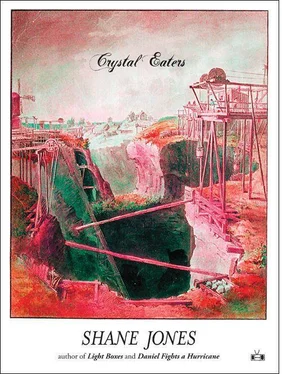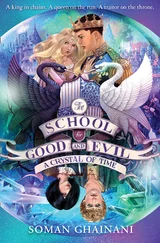A man is working in one of the tunnels. He looks familiar, but not familiar in the sense that he’s a mine worker. Skip Callahan asks where his work clothes are and Z. says he forgot them at home, that everything he owns is saturated with dirt and sweat from working and the weather. Skip shrugs, not recognizing Z. from the table in the street incident, but still thinks they’ve met before. He considers asking if he knows him from Eddies or if he’s a member of Brothers Feast who Skip has always actively ignored. At first Skip decides on saying nothing. He’s impressed at how hard Z. is working because the heat wave has slowed everyone. He watches and tells himself to back off, let this man work, don’t upset him, but he can’t help himself.
Skip says, “Might want to consider going shirtless. It’s my move, but you can have it.”
“Thanks,” says Z. “I’m new here. Thank you.”
“Doesn’t matter,” says Skip. There’s a break in his thinking, his eyes kind of glazing over. Then: “Have we met?”
“Parents worked here. You know my father, Richard? We look the same. This is his idea. Mom says we have the same bone structure, something about our foreheads. We cross our legs the same way when we sit. Drives her nuts when we’re watching the TV.”
“At Eddies?”
“I don’t drink. And I don’t forget a face.”
Skip studies the man before him and thinks maybe it’s the heat, or the shock from seeing a girl run like a dog, an image that continuously haunts him, because his mind keeps breaking, keeps going black like he’s passing out for a few seconds here and there and then coming back into a gauzed reality. He can’t sleep at night. He stares at walls. He’s impressed that someone is not only working, but working so hard in the heat wave. The call for more workers — parchment nailed to trees and public bathrooms — was put out weeks ago and too few new faces have arrived. The village dims in evening because workers are mining less yellow and the city has taken notice, men at newly installed binocular stations writing in lined notebooks noting it as a weakness, another reason it should be overtaken. There’s a “binocular station attendant” dressed in blue who walks back and forth, nodding and smiling in a depressed kind of way.
Z. knows what to say, how to change Skip’s eyes. “What matters is work,” he says. “Dad always told me that if you’re not working, then you’re not working.”
Skip goes, “Ha!”
Z. finds a pick-ax. The workers stay away because Z. is insane with motion and he’s making them look bad. When the evening aims for dark, the workers gone for the day and shaking their heads in disbelief over pints of ale at Eddies at the man who accomplishes more than five of them combined, Z. uses the pick-ax to break into a shed. He steals a helmet with a light and a shovel with a short handle. Before running back into the tunnel he stops and looks up at the sky. From a great distance, looking down from where Z. stares, is that a star, maybe that’s a star , he is tiny standing in the mine, almost unnoticeable, nearly nothing. He stops looking up when he suddenly enters a coughing fit. The air is a black oven. Bugs drip from the sky and Z. has swallowed one.
Inside the tunnel he stabs the dirt wall with the shovel where his hands and pick-ax previously clawed. He digs until he forms a door. He digs until he’s working in a hallway. He throws piles of dirt behind him until he’s so deep inside he has to walk piles out. Soon he’s traveling through another hallway, this one too lacking black crystal. When he finds yellow, or blue, he tosses them into separate piles for the trucks to gather in the morning. He works until he can’t lift his arms.
He sleeps huddled in a fetal position against a wall of dirt which is surprisingly cool and comforting.
He wakes, rolls onto his side with rocks piercing his skin, and vomits something red. His count is lowering with having to live. With slits for eyes caked closed with dirt he walks from the mine tunnel and into the low sunshine of morning to workers drinking coffee from ceramic mugs. They roll their eyes at Z., sneer dirt, then go back to their conversations about what will happen to them, what’s the deal with the sun, what’s your number. Even in morning the heat is shocking.
Skip Callahan walks past. “Saw a girl running like a dog once. Like, a real dog, on all fours and everything. Everyone, yeah you, gives me a hard time for talking about it. Keeps me up at night because I only wanted to help, see if she was okay. I think of going back to the house but what would I say? You’re like a mole and we need more moles. Jesus, you worked all night, huh? Don’t need another person who sits around drinking coffee,” says Skip, the last few words louder and directed at the workers.
Z. smiles, looks worried.
“Thanks,” says a worker to Z. “THANK YOU FOR HELPING!”
The workers climb into gun metal trucks and drive into the tunnels. Some grab shovels leaning against idling trucks and walk in. The clang and bang of machines, hammers. When Z. looks up from left to right the sky scans from red to white.
Dad enters Remy’s room and says Mom has one remaining. He tells her to leave her alone because something has happened to her mouth. Remy sits atop a mountain of pillows on her bed. She’s drawn pictures of black crystals all over the walls and ceiling. Where the red crystal once was, with the baby inside, has been blackened in scramble.
“We should just go.”
“Can’t,” says Dad.
“Why? Because of the fence? Because of Adam? Sorry. Actually, I’m not. I don’t think there’s anything in this world that can’t be said. Just because we’re different from them doesn’t mean we’re bad. It doesn’t mean we can’t try to save her. They are coming in anyways.”
“It doesn’t matter where we go because you can’t reverse what is happening to her.”
“You see everything as dying.”
Remy moves forward on the mountain of pillows which are balanced in a way so she slides down and lands on her feet with a jump. Dad extends his hands like he’s going to catch her but she stands tall, doesn’t need his help. From outside, Remy hears something. She makes a shhhhhhhhh sound with a finger over her lips and Dad turns toward the window. Running circles around the house is Hundred barking at the sun. He speeds past the window like black liquid, red sky behind him. He disappears for a few moments, the barking going small, the red sky appearing touchable, then reappears, a noisy smear going past the window.
“I’m sorry,” says Dad.
“I’m sorry too.”
“You are?”
“I’m sorry we never tried everything we could to save Mom.”
Dad climbs to the roof and watches the city lights come on. They look brighter. The heat turns his shirt transparent with sweat and in several random places on his body he picks the fabric off his skin. The only thing he has to think about is her. He considers going to the hospital where people are rumored to be pumped full of crystals (Chapter 14, Resurrection, City Hospital Myth) but that means making a decision. Besides, he’s never believed in the myth. It means taking a risk instead of just letting time decide. He understands what her face says without her saying a thing, that she wants to go. He’s spent so much time doing nothing for her because everything stays inside him and rings his head and the grip of his thoughts can’t get any tighter. And then there’s Remy, what she wants him to do.
He sits with his knees drawn into his eye sockets and wishes he could move himself to tears because he feels crystals crushing, buildings burning, dogs dying. Inside, he is a blubbering mess, but outside he’s a man who just can’t show it. He was never like this in Younger Years. He spoke more. He expressed himself with chosen words and hand gestures. There was a time when Mom asked how he was feeling and without hesitation he gave an honest answer, not a reply like good . He once told her while sitting on the edge of the bed with his face in his hands that he felt depressed, don’t laugh, something was wrong. He described his body as cement filled and horizontal. On some days he didn’t speak to anyone until he got home and said hello, how was your day, the words leaving his body feeling alien. He said he was an awful father and husband because the way he was limited her and Remy, their life. Back then he spoke openly, and he remembers the way he was. That version would go to the city.
Читать дальше











